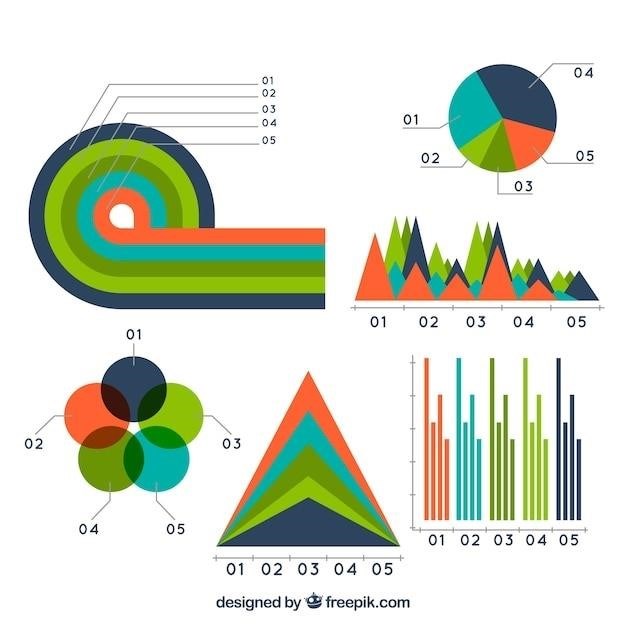GATE Mechanical Engineering Conceptual Questions⁚ A Comprehensive Guide
This guide offers a structured approach to mastering conceptual GATE Mechanical Engineering questions. We explore effective strategies, utilize past papers, and recommend resources for comprehensive practice, ultimately enhancing your understanding and problem-solving skills for exam success. Preparing thoroughly increases your chances of achieving a high score.
Importance of Conceptual Understanding in GATE ME
In the GATE ME examination, a strong conceptual foundation is paramount for success. While rote memorization might offer short-term gains, it lacks the depth required to tackle the complex, application-based questions frequently encountered. A true understanding of fundamental principles allows you to approach unfamiliar problems systematically, breaking them down into manageable components and applying relevant theories. This approach is far more effective than simply recalling formulas. The ability to connect concepts across different subjects is crucial; for example, understanding thermodynamics principles enhances your ability to solve fluid mechanics problems. Conceptual clarity fosters adaptability, enabling you to handle variations in question types and difficulty levels. Moreover, a profound understanding leads to more efficient and accurate problem-solving, saving valuable time during the exam and reducing the likelihood of careless errors. Therefore, prioritizing conceptual learning significantly improves your chances of achieving a top rank in the GATE ME exam.
Key Subjects for Conceptual Focus in GATE ME
Several core subjects within Mechanical Engineering demand a strong conceptual grasp for success in the GATE exam. Engineering Mechanics forms the bedrock, requiring a deep understanding of statics, dynamics, and strength of materials principles. Thermodynamics and Heat Transfer necessitate a thorough understanding of energy transfer, cycles, and property relationships. Fluid Mechanics and Machinery requires a firm grasp of fluid behavior, pressure, flow, and the functionality of pumps and turbines. Production and Industrial Engineering necessitates comprehension of manufacturing processes, optimization techniques, and operations management. Machine Design demands a solid understanding of stress analysis, failure theories, and component design principles. A strong foundation in these areas is not merely about memorization; it’s about developing an intuitive sense of how these systems and processes work, which enables you to solve a wide range of complex problems efficiently and accurately within the time constraints of the examination.
Effective Strategies for Mastering Conceptual Questions
Effective preparation for GATE ME conceptual questions involves a multi-pronged approach. Begin by building a strong foundation in fundamental principles through diligent study of textbooks and reputable online resources. Active recall techniques, such as self-testing and explaining concepts aloud, are crucial for solidifying understanding. Focus on understanding the underlying physical phenomena rather than simply memorizing formulas. Practice is paramount; solve a wide variety of problems, starting with simpler ones and gradually progressing to more complex scenarios. Analyze your mistakes meticulously; understand where your reasoning faltered and adjust your approach accordingly. Regularly review previously learned concepts to reinforce retention. Consider using visual aids, diagrams, and mind maps to enhance your comprehension and recall. Engage in collaborative learning with peers to discuss challenging concepts and share problem-solving strategies. Consistent effort and strategic practice are key to mastering the conceptual aspects of the GATE ME examination.
Utilizing Previous Year’s GATE ME Question Papers
Past GATE ME question papers are invaluable resources for effective exam preparation. Analyzing these papers provides insights into the exam pattern, the types of questions asked, and the relative weightage of different topics. By solving previous years’ papers, you become familiar with the question format, improve your time management skills under pressure, and identify areas where your understanding needs reinforcement. Focus not just on getting the correct answer, but also on understanding the underlying concepts and problem-solving strategies used in the solutions. Pay attention to the keywords and the way questions are framed, as this can significantly impact your approach to solving them. Regularly reviewing and re-solving previous years’ papers helps to consolidate your knowledge and build confidence. This iterative process of practice and analysis is crucial for improving your performance and achieving your desired score. Downloading these papers in PDF format offers convenient access for repeated practice and self-assessment. The availability of subject-wise and chapter-wise question papers allows for targeted practice and identification of weaknesses.

Analyzing the Difficulty Level and Pattern of GATE ME Questions
A thorough analysis of the difficulty level and pattern of GATE ME questions is crucial for effective preparation. Reviewing previous years’ papers reveals trends in question types, such as Multiple Choice Questions (MCQs), Numerical Answer Type (NAT) questions, and Multiple Select Questions (MSQs). Understanding the distribution of questions across various subjects helps in prioritizing your study plan. Identify recurring themes and concepts that frequently appear in the exam. Assess your strengths and weaknesses by analyzing your performance on practice questions. Pay close attention to the level of detail required in your answers, particularly for NAT and MSQ types, which often demand a more thorough understanding of the underlying principles. Note the time allocated for each section and develop a strategy to manage your time effectively during the actual exam. By understanding the intricacies of the question patterns and difficulty levels, you can tailor your preparation strategy to maximize your chances of success. Regular practice with a variety of questions will enhance your ability to tackle questions of varying difficulty levels with confidence.

Recommended Resources for Conceptual Practice
To effectively prepare for conceptual GATE Mechanical Engineering questions, a multi-faceted approach using diverse resources is recommended. Previous years’ GATE question papers are invaluable, providing insight into the exam’s structure and difficulty level. Supplement this with standard textbooks covering core mechanical engineering subjects. These provide a strong foundation for understanding fundamental concepts. Consider using specialized practice books focusing on conceptual questions, offering detailed explanations and solutions. Online platforms offering topic-wise practice questions and mock tests can further enhance your preparation. These platforms often provide feedback and performance analysis, aiding in identifying areas requiring further attention. For specific subjects like Engineering Mechanics, Strength of Materials, or Thermodynamics, dedicated resources may prove beneficial. Remember that consistent practice is key; regular problem-solving enhances understanding and builds confidence. Don’t hesitate to seek clarification from instructors or online communities when facing challenging concepts. A well-rounded approach using a combination of these resources will significantly improve your grasp of the subject matter and enhance your performance on the GATE exam.
Online Platforms and Resources for GATE ME Preparation
Numerous online platforms offer valuable resources for GATE Mechanical Engineering preparation, particularly for conceptual understanding. Websites like GATE Academy and ExamSIDE provide practice questions, previous year’s papers, and video solutions. These platforms often categorize questions by subject and difficulty level, allowing for focused practice. YouTube channels dedicated to GATE preparation offer lectures, concept explanations, and problem-solving sessions. These visual aids can greatly enhance comprehension, especially for complex topics. Online forums and communities provide a space for interaction with fellow aspirants, allowing for collaborative learning and doubt clarification. Remember to carefully evaluate the credibility and accuracy of information found online, prioritizing reputable sources and well-structured content. Utilizing a mix of platforms, including those offering mock tests and subject-specific practice materials, will ensure a comprehensive and effective preparation strategy. Remember to manage your time effectively and focus on consistent practice rather than simply accumulating resources.
Subject-wise Practice⁚ Engineering Mechanics
Engineering Mechanics forms a crucial foundation for many GATE Mechanical Engineering topics. Effective practice requires a structured approach. Begin by reviewing fundamental concepts like statics, dynamics, and strength of materials. Focus on understanding the underlying principles rather than rote memorization. Solve a variety of problems, starting with simpler ones to build confidence and gradually progressing to more complex scenarios. Utilize textbooks like “Engineering Mechanics⁚ Statics and Dynamics” by R.C. Hibbeler or similar resources for a thorough understanding of the theoretical framework. Pay close attention to free-body diagrams, equilibrium equations, and kinematic relationships. Practice problems involving trusses, beams, and other structural elements are essential. Online resources often offer subject-specific question banks and previous years’ GATE questions categorized by topic; Regular practice is key to internalizing the concepts and developing efficient problem-solving techniques. Remember to analyze your mistakes and learn from them to improve your understanding and performance. Thorough subject-wise practice in Engineering Mechanics significantly enhances your overall GATE preparation.
Subject-wise Practice⁚ Thermodynamics and Heat Transfer
Thermodynamics and Heat Transfer are interconnected subjects vital for success in the GATE Mechanical Engineering exam. Begin by mastering fundamental concepts like thermodynamic laws, properties of pure substances, and thermodynamic cycles (Rankine, Brayton, Otto, Diesel). Understand the different types of heat transfer mechanisms – conduction, convection, and radiation – and their governing equations. Practice problems involving heat exchangers, boilers, turbines, and other thermal systems are crucial. Textbooks such as “Fundamentals of Thermodynamics” by Borgnakke and Sonntag or “Heat and Mass Transfer” by Incropera and DeWitt provide a solid theoretical base. Focus on understanding the underlying principles and their applications. Solve problems involving property calculations, energy balances, and entropy changes. For heat transfer, practice problems involving steady and unsteady-state heat conduction, convection correlations, and radiation heat exchange are important. Utilize online resources, such as previous years’ GATE question papers, to get familiar with the exam pattern and identify your strengths and weaknesses. Consistent practice and a clear understanding of the fundamental concepts will significantly improve your performance in this crucial area of the GATE exam. Remember to analyze solved examples to understand different approaches to problem-solving.
Subject-wise Practice⁚ Fluid Mechanics and Machinery
Fluid mechanics and machinery form a significant portion of the GATE Mechanical Engineering exam. A strong conceptual understanding is key to success. Begin by reviewing fundamental concepts like fluid properties, fluid statics, and fluid dynamics. Master the principles of Bernoulli’s equation, continuity equation, and Navier-Stokes equations. Practice solving problems related to pipe flow, open channel flow, and dimensional analysis. Understanding different types of pumps, turbines, and compressors is essential. Study their operating principles, performance characteristics, and efficiency calculations. Focus on concepts like head, power, and efficiency for pumps and turbines. For compressors, understand different types like centrifugal and axial compressors and their performance parameters. Explore the intricacies of fluid flow through various components like nozzles, diffusers, and valves. Utilize standard textbooks like “Fluid Mechanics” by Frank M. White or “Fluid Mechanics Fundamentals and Applications” by Yunus A. Cengel and John M. Cimbala for a strong theoretical foundation. Solve a variety of problems from these texts and previous GATE question papers. Remember that consistent practice and a clear understanding of fundamental concepts are crucial for excelling in this section of the exam. Focus on applying your knowledge to solve practical engineering problems.
Utilizing Video Solutions for Enhanced Learning
Leveraging video solutions significantly enhances GATE preparation, particularly for tackling conceptual mechanical engineering questions. Many online platforms offer detailed video explanations for previous years’ GATE questions. These videos often start with a recap of the fundamental concepts relevant to the problem, providing a solid base before diving into the solution. The step-by-step approach in video solutions clarifies complex problem-solving techniques. Visual aids and animations make abstract concepts more accessible, improving comprehension and retention. Furthermore, instructors in these videos often share valuable tips and tricks to efficiently approach similar problems in the future. This reduces the likelihood of making common mistakes. Watching video solutions helps identify personal weaknesses in understanding specific topics or applying particular methods. This targeted feedback allows for focused improvement. While self-study is important, video solutions provide a dynamic learning environment, complementing textbooks and practice problems. By actively engaging with visual explanations and expert guidance, candidates can achieve a deeper grasp of the subject matter and boost their confidence in tackling complex problems, leading to improved performance in the GATE exam.


